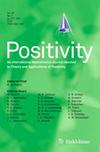On logarithms of measures
IF 0.9
3区 数学
Q2 MATHEMATICS
引用次数: 0
Abstract
Abstract Let A be a Banach algebra and let $$x\in A$$关于测度的对数
摘要设A是一个Banach代数,且设$$x\in A$$ x∈A具有其谱不将0与无穷分开的性质。众所周知,x有对数,即存在$$y\in A$$ y∈a,且$$x=e^y$$ x = ey。我们将使用这个语句来确定在局部紧群上定义的具有对数的测度。同样,我们将证明上述陈述的反面通常是不正确的。我们的结果将与无限可分的概率测度有关。
本文章由计算机程序翻译,如有差异,请以英文原文为准。
求助全文
约1分钟内获得全文
求助全文
来源期刊

Positivity
数学-数学
CiteScore
1.80
自引率
10.00%
发文量
88
审稿时长
>12 weeks
期刊介绍:
The purpose of Positivity is to provide an outlet for high quality original research in all areas of analysis and its applications to other disciplines having a clear and substantive link to the general theme of positivity. Specifically, articles that illustrate applications of positivity to other disciplines - including but not limited to - economics, engineering, life sciences, physics and statistical decision theory are welcome.
The scope of Positivity is to publish original papers in all areas of mathematics and its applications that are influenced by positivity concepts.
 求助内容:
求助内容: 应助结果提醒方式:
应助结果提醒方式:


